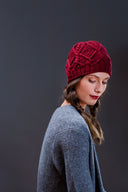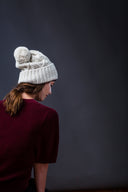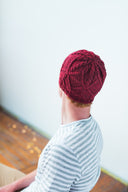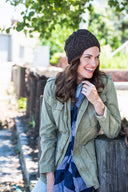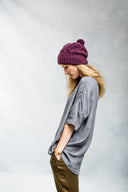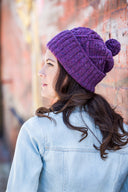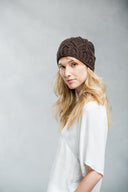Skiff
Pattern Specs
CONSTRUCTION
- Both versions are worked in the round from the brim to the crown.
GAUGE
- 26 stitches & 32 rounds = 4″ in Chart pattern with Size A needle(s), after blocking
- One 21-stitch motif from Skiff Chart measures 3¼” wide with Size A needle(s), after blocking
NEEDLES
Both Versions:
Size A (for Main Fabric):
- One 16″ circular needle and one set of double-pointed needles (DPNs)* in size needed to obtain gauge listed
- Suggested Size: 5 mm (US 8)
Size B (for Ribbing):
- One 16″ circular needle*, five sizes smaller than Size A
- Suggested Size: 3¼ mm (US 3)
Beanie only:
Size C (optional; for Tubular Cast On only):
- One 16″ circular needle, one size smaller than Size B
- Suggested Size: 3 mm (US 2½)
Watchcap only:
Size D (for Lower Ribbing):
- One 16″ circular needle*, two sizes smaller than Size A
- Suggested Size: 4 mm (US 6)
Size E (for Tubular Cast On and Turning Round only):
- One 16″ circular needle, one size smaller than Size D
- Suggested Size: 3¾ mm (US 5)
*32″ circular needle can be used instead of 16″ circular and DPNs if using the Magic Loop method for working small circumferences in the round.
Both Versions: If you have adjusted the needle size to obtain the correct gauge, it may or may not be necessary to make a matching adjustment to the needle size used for Tubular Cast On due to variance in individual work. Please test your chosen cast-on method on your swatch.
FINISHED DIMENSIONS
- 19½” [49.5 cm] circumference (to comfortably fit average adult head sizes 20-23″ [51-58 cm]); 8¼ (9¾)” [21-25 cm] length, with brim folded up (for watchcap only)
Please note: the stitch patterns for this garment are charted only.
Japanese translation provided by Amirisu. For any questions regarding the translation, please contact them at amirisu.info@gmail.com.
Pattern Materials
YARN
- 2 (3) skeins of Brooklyn Tweed Shelter (100% American Targhee-Columbia wool; 140 yards/50g)
- Photographed in colors Pumpernickel & Long Johns (Beanie) and Homemade Jam, Thistle & Fossil (Watchcap)
YARDAGE
Beanie:
- 200 yards of worsted weight wool yarn
Watchcap:
- 270 yards of worsted weight wool yarn (+150 yards for optional pom-pom)
Techniques
Tutorials for all special techniques listed below are included in the pattern:
- Tubular Cast On (for 2×2 ribbed fabric)
Errata
9 April 2018: Version 2.1
On page 8, under Begin Main Pattern, the following has been altered:
Next Round: Work Round 1 of Skiff Chart, increasing and decreasing as indicated on chart, and working 21-stitch repeat 6 times. (126 stitches now on needle)
9 February 2015: Version 1.1
A missing grid line was added to Round 16 of the Skiff Chart between stitches 12 and 13, so that these read properly as two knit stitches.
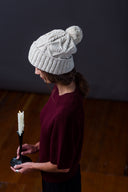
Skiff
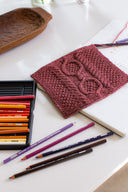
Uncompromising Excellence in Every Detail

